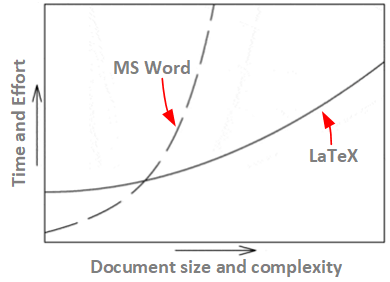The choice between LaTeX and Microsoft Word depends on the specific needs and preferences of the user, as well as the context in which the document is being created. Both LaTeX and Word have their strengths and weaknesses, and the suitability of each depends on various factors. Let’s explore some aspects to consider when comparing LaTeX and Word.
Comparison between LaTeX and Word
Document Complexity
LaTeX: It excels in handling complex documents, especially those with mathematical equations, technical notations, and extensive bibliographies. LaTeX is particularly favored in academic and scientific communities for its superior handling of these elements.
Word: While it can handle various document types, it may face challenges in maintaining consistency and precision when dealing with complex mathematical expressions or scientific content.
Typesetting Quality
LaTeX: It is renowned for its exceptional typesetting capabilities. LaTeX documents are clean and professional, especially regarding complex formatting and mathematical notation.
Word: While it has improved its typesetting capabilities, LaTeX still produces more aesthetically pleasing documents, particularly in academic and scientific contexts.
User Interface and Ease of Use
LaTeX: It has a steeper learning curve, especially for beginners unfamiliar with markup languages. Users need to write code to structure the document, which can be challenging initially.
Word: It is generally considered more user-friendly with its WYSIWYG (What You See Is What You Get) interface. Most users find it easier to learn and use, making it a popular choice for general-purpose document creation.
Collaboration and Compatibility:
LaTeX: Collaboration can be more challenging, especially if collaborators are unfamiliar with LaTeX. However, LaTeX documents can be easily converted to PDF, a widely compatible format.
Word: It is a common document-sharing and collaboration standard in many professional settings. Word documents can be easily shared and edited collaboratively using various cloud-based platforms.
Customization and Automation
LaTeX: It offers extensive customization options, allowing users to control every aspect of document formatting. It is highly suitable for automation of document generation and large-scale production.
Word: While it provides customization options, the level of control is not as fine-grained as in LaTeX. Automation features are available but may not be as flexible or robust as in LaTeX.
Common Usage:
LaTeX: It is widely used in academic and scientific communities, particularly for preparing research papers, theses, and technical documents.
Word: It is a standard tool in various industries for general-purpose document creation, including business reports, letters, and other standard office documents.
Cost
LaTeX: It is free and open-source, and its distribution is available for various operating systems.
Word: It is a proprietary software, and users must purchase licenses. However, Microsoft has introduced subscription-based models and free online versions with limited functionality.
Can LaTeX replace Microsoft Word?
LaTeX and Microsoft Word serve similar purposes as document preparation tools. They have different strengths and are suited for different types of users and tasks.
While LaTeX is a powerful tool for specific types of documents, it may not be the ideal replacement for Microsoft Word in all situations. The choice between the two depends on the nature of the documents you need to create, your familiarity with markup languages, and your collaboration requirements. Many users find that combining both tools, depending on the task, provides the most flexibility and efficiency.
You can also read our post on Is LaTeX Outdated or Still Relevant?

The above graph compares the time and effort required to create documents of varying sizes and complexities using MS Word and LaTeX. The graph suggests that MS Word requires less time and effort for smaller, less complex documents. However, as document size and complexity increase, LaTeX becomes more efficient. At the point where two curves are cut, LaTeX becomes more efficient than MS Word in terms of time and effort.
Conclusion
The choice between LaTeX and Word depends on the specific requirements of the task at hand. LaTeX is often preferred for complex and technical documents, while MS Word is widely used for general-purpose documents, collaborative work, and ease of use. Many users find themselves using a combination of both tools depending on the context and specific needs of a project.
